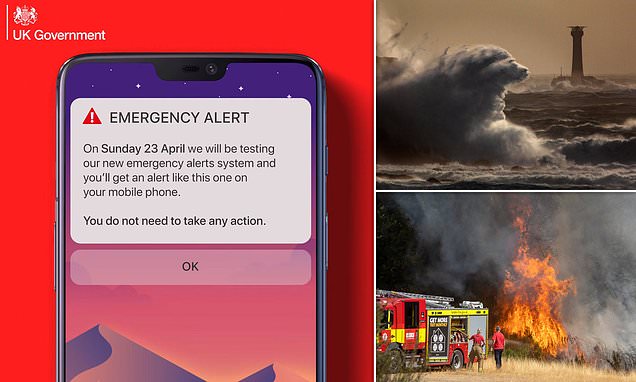
How the Government plans to use its new emergency alert message system
April 17, 2023Flooding, storm surges, wildfires or industrial gas leaks: How the Government plans to use its new emergency alert message system – which will be tested this Sunday at 3pm (and make your phone sound and vibrate, even if it’s on silent)
- Messages will urge locals to take specific action, such as prepare for evacuation
Floods, storm surges, wildfires or industrial gas leaks could see Britons sent emergency messages on their mobile phones under the UK’s new alert system.
Messages would urge local populations to take specific action, such as to prepare themselves for evacuation, if they are deemed to be at risk.
The roll-out of the Government’s new emergency alert system – which will copy similar schemes in the US, Canada, Netherlands and Japan – will continue this weekend with a UK-wide trial.
This will see millions of Britons receive a test message at 3pm on Sunday.
The early months of the emergency alert system will see the Government and emergency services focus on sending alerts related to extreme weather or flooding.
It could later be widened to include messages about escaped dangerous prisoners, or cases of child abduction.
But there are not plans to use the emergency alert system to warn about marauding terror attacks, such as the London Bridge attack in 2017.
A UK-wide trial will see millions of Britons receive a test message on their mobile phones at 3pm on Sunday
The early months of the emergency alert system will see the Government and emergency services focus on sending alerts related to extreme weather or flooding
Alerts could also be sent to warn about wildfires – such as those seen during last summer’s heatwave
Sunday’s nationwide trial will see those with 4G and 5G-capable phones see a message pop up on their home screens on St George’s Day.
It will be accompanied by sound and vibration for up to 10 seconds, even if your phone has been set to silent.
The message will read: ‘This is a test of Emergency Alerts, a new UK government service that will warn you if there’s a life-threatening emergency nearby.
‘In a real emergency, follow the instructions in the alert to keep yourself and others safe. Visit gov.uk/alerts for more information.
‘This is a test. You do not need to take any action.’
Phone users will be prompted to swipe away the message or click ‘OK’ on their home screen before being able to continue using their device.
Drivers are advised not to look at or touch their phone until it is safe, just as when receiving any call or message.
Around 20 different countries already have emergency alert systems in place.
The UK’s system will be controlled by the Government’s emergency COBRA unit, with messages sent to large numbers of people needing to be signed off by ministers.
Although messages can be sent to the whole UK population, they can also be sent to targeted local groups.
Test messages have already been sent to local populations in East Suffolk and Reading, Berkshire.
Along with floods or extreme weather events, alerts could also be sent to warn about wildfires – such as those seen during last summer’s heatwave, emergencies at nuclear power plants, or leaks from other industrial plants.
The system would be used to urge people to take specific action, for example to go inside and shut all doors and windows in the event of an industrial gas leak, or to prepare for evacuation in the event of a storm surge in coastal areas.
Alerts will only be issued in situations where they are deemed necessary to protect lives, or prevent serious harm or significant damage to property.
Officials are conscious that sending too many alerts could see people become apathetic to the system and perhaps ignore emergency advice in future.
Beyond the scheme’s pilot phase, which will last for several months and focus on flooding and extreme weather events, the usage of alerts could later be broadened.
The Cabinet Office will hold discussions with the police and other emergency services on the best use of alerts for events such as terror attacks.
But they have ruled out the use of alerts during emergencies such as the attack at London Bridge in 2017, which saw terrorists stab people in and around restaurants and pubs.
The current advice for people caught up in a marauding terror attack is to ‘run, hide, and tell’, with worries that the sending of an emergency alert could make attackers aware of the location of someone hiding.
Officials are also concerned about the complication of giving specific advice during such an attack, when terrorists could quickly move from one area to another.
But an alert could be issued in the event that a car bomb has been discovered and when emergency services need to clear a local area.
Officials have ruled out the use of alerts during emergencies such as the marauding terror attack at London Bridge in 2017
Oliver Dowden, the Chancellor of the Duchy of Lancaster, hailed the new system as ‘a vital tool to keep the public safe in life-threatening emergencies’
Those not wishing to receive Sunday’s test message can put their phone on airplane mode, while the alert messages can be turned off completely through your phone’s settings.
Government officials have held talks with driving organisations, domestic violence groups, and sight-impaired or visually-impaired charities about the potential problems with the emergency alert system.
Domestic violence campaigners have warned the test could put people in danger by revealing the location of secret phones hidden away by those at risk.
Officials stressed that it is easy to opt out of the system if people need their phone to stay concealed, either by turning off emergency alerts in their settings or simply having the phone switched off during the test.
Emergency advice would continue to be issued by the Government through TV, radio stations and other local media, with the new alert system being only one part of its ‘warn and inform’ strategy.
The test on St George’s Day coincides with major events including the London Marathon and the 2pm kick-off Premier League ties between Bournemouth and West Ham and Newcastle and Tottenham Hotspur.
Officials said they have worked with the Football Association and the Marathon’s organisers to make sure the impact of the test will be limited.
Chancellor of the Duchy of Lancaster Oliver Dowden said: ‘At 3pm next Sunday we’ll be doing a nationwide test of our new Emergency Alerts system.
‘Getting this system operational means we have a vital tool to keep the public safe in life-threatening emergencies. It could be the sound that saves your life.’
Source: Read Full Article







